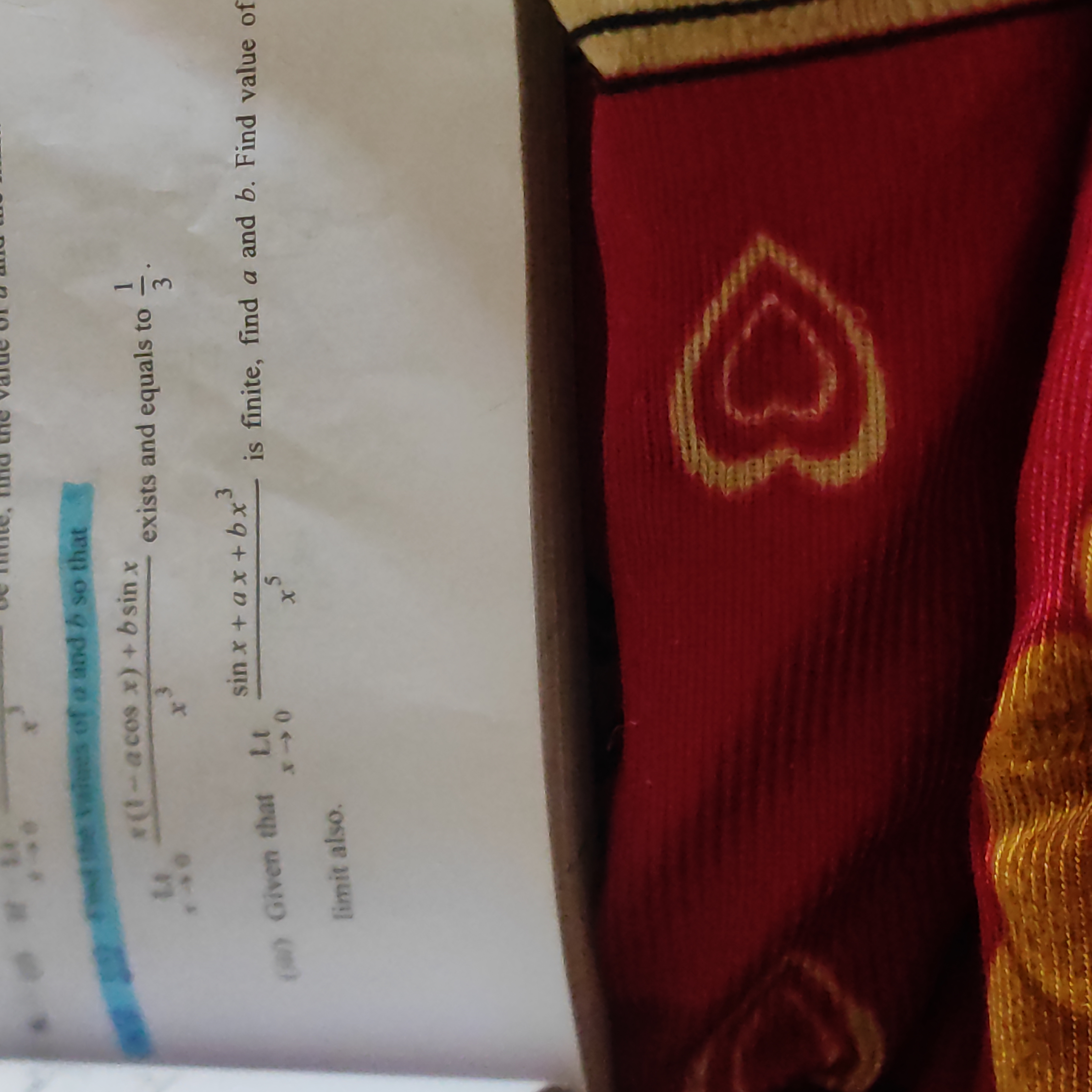Given that lim (x → 0) [(1 - a cos 3x) + 6 sin x] / [sin x + a x + b x^3] is finite, find the values of a and b.

Understand the Problem
The question is about finding the values of variables 'a' and 'b' in a given mathematical expression while ensuring that the limit exists and is finite as 'x' approaches 0. It involves analyzing a limit with terms including sine functions and polynomial expressions.
Answer
The values are \( a = 1 \) and \( b = 0 \).
Answer for screen readers
The values of ( a ) and ( b ) are ( a = 1 ) and ( b = 0 ).
Steps to Solve
-
Identify the Limit Expression
We need to analyze the limit:
$$ \lim_{x \to 0} \frac{(1 - a \cos 3x) + 6 \sin x}{\sin x + a x + b x^3} $$ for it to exist and be finite. -
Evaluate the Numerator at x = 0
Substituting $x = 0$ in the numerator:
$$ 1 - a \cos(0) + 6 \sin(0) = 1 - a $$ -
Evaluate the Denominator at x = 0
Substituting $x = 0$ in the denominator:
$$ \sin(0) + a(0) + b(0)^3 = 0 $$
Since the denominator approaches 0, we need the numerator to also approach 0 for the limit to be finite. -
Set the Numerator to Zero
For the limit to be finite, we must have:
$$ 1 - a = 0 \implies a = 1 $$ -
Substitute a into the Limit Expression
Now substitute $a = 1$ into the original limit:
$$ \lim_{x \to 0} \frac{(1 - \cos 3x) + 6 \sin x}{\sin x + x + b x^3} $$ -
Simplify the New Limit Expression
As $x \to 0$, we have:
- $1 - \cos(3x) \approx \frac{(3x)^2}{2} = \frac{9x^2}{2}$
- $6 \sin x \approx 6x$
Thus, the numerator is approximately:
$$ \frac{9x^2}{2} + 6x $$
-
Evaluate the New Denominator Close to x = 0
Substituting $a = 1$ in the denominator gives:
$$ \sin x + x + b x^3 \approx x + x + b x^3 = 2x + b x^3 $$ -
Formulate Limit Expression
Now calculating the limit becomes:
$$ \lim_{x \to 0} \frac{6x + \frac{9x^2}{2}}{2x + b x^3} $$
This leads to:
$$ \lim_{x \to 0} \frac{x(6 + \frac{9x}{2})}{x(2 + b x^2)} = \lim_{x \to 0} \frac{6 + \frac{9x}{2}}{2 + b x^2} $$ -
Evaluate the Limit as x Approaches 0
Taking the limit as $x \to 0$:
$$ \frac{6}{2} \implies \text{The limit exists and equals } 3 $$
We want the limit to match the given finite condition, so we must have $b = 0$.
The values of ( a ) and ( b ) are ( a = 1 ) and ( b = 0 ).
More Information
The limit must be finite and exist, which requires the numerator and denominator to approach zero together at ( x = 0 ). With the correct values of ( a ) and ( b ), the limit resolves to a finite value.
Tips
- Forgetting to simplify expressions appropriately, especially for small values of ( x ).
- Incorrectly substituting values into sine and cosine approximations, leading to erroneous limits.
AI-generated content may contain errors. Please verify critical information